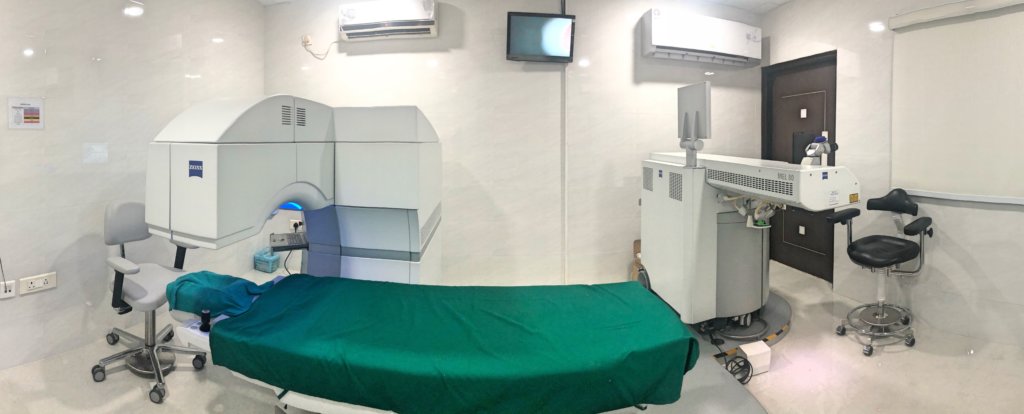Laser Refractive Surgery (LRC) or Laser Vision Correction (LVC) essentially uses Lasers to correct refractive error of eye. Excimer Lasers have been used for this purpose for a long time and enjoy a lot a favour because of exceptional results, stable correction and very low complication rate. Accuracy and safety of results have achieved a whole new level with the introduction of Femtosecond Lasers.
We, at Mahajan Eye Centre (MEC), are proud to boast of one the most pristine Laser Refractive Surgery Setup using both Excimer and Femtosecond Lasers for the world leader in optoelectronics, Zeiss. A combination setup of Zeiss Mel 80 (Excimer Laser) and Visumax (Femtosecond Laser) help us perform all the possible modalities of laser Refractive surgery including the latest generation SMILE.
 Visumax and Mel Combi Setup at MEC
Visumax and Mel Combi Setup at MECLVC Procedures
The Laser Vision Correction technology can actually be divided into three different surgery representing three different generations of LVC.
- PRK (Photorefractive Keratectomy) (1st Generation LVC)
- LASIK (Laser Assisted In-Situ Keratomileusis) (2nd Generation LVC)
- SMILE (Small Incision Lenticule Extraction) (3rd Generation LVC)
Understand Laser Vision Correction Technology and Types (MEC YouTube Channel)
Bursting Myths about Refractive Surgery!
- Is Painful
- Correction is Temporary/ Power will return after some time
- Cannot work on screens/ computers after surgery
- High-Risk for permanent eye damage/ Blindness
- Procedures are long
- Is only for Myopia
- May Burn Eyes
- Long term effects are unknown
- Laser Eye surgery is not affordable
When is Refractive Eye Surgery Not Right for Me?
- If you are under 18 years of age
- If you have uncontrolled diabetes & glaucoma
- If your contact lens or glass prescription was changed the previous year
- If you have abnormal wound-healing due to disease or medication
- If you are pregnant or breastfeeding
How do I Prepare Myself for Refractive Surgery?
- Discontinue contact lenses a week before your eye test with a doctor
- Carry your previous glass prescriptions along for your visit
- Undergo detailed examination before the procedure
- Be clear about your expectations and motivation for the procedure
- Trust your doctor’s choice of procedure for your eyes
- Do not wear eye makeup for the procedure
- Plan a few days rest to care for your eyes after the procedure
- Avoid swimming, beach holidays for a week after the procedure